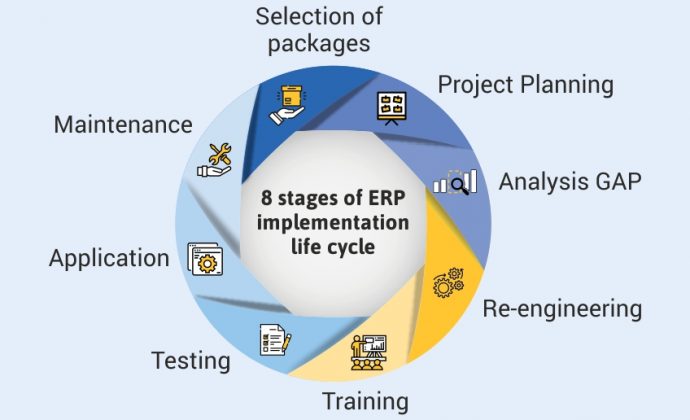Company operations can be better managed and optimised with the use of enterprise resource planning (ERP) systems, which are software platforms that automate and integrate numerous business activities. ERP systems are very effective in the healthcare business for managing patient data, improving operational operations, and meeting regulatory requirements.
Health care organisations can benefit from ERP by enhancing patient care through increased efficiency and decreased error rates. However, putting in place an enterprise resource planning system may be difficult and time consuming, necessitating meticulous planning and the assistance of a seasoned implementation partner.
Enterprise resource planning (ERP) technologies can help healthcare companies streamline their operations and improve efficiency. The healthcare industry can benefit from ERP systems in several ways, including:
Care for patients is enhanced because of the ability of ERP systems to centralise patient data for easier access and management.
- Appointment scheduling, billing, and inventory management are just a few examples of the many administrative tasks that may be automated with the help of an enterprise resource planning (ERP) system for the healthcare industry.
- Data security is improved by ERP systems, which enable healthcare providers meet the requirements of laws like HIPAA.
- ERP systems can improve healthcare professionals’ productivity by automating repetitive processes and giving them a clear picture of their operations in real time, thereby saving time and decreasing the likelihood of mistakes.
- ERP systems can help healthcare providers centralise patient record storage and management, which in turn increases data accuracy and ease of access.
- Healthcare organisations can save time and money by using ERP software to streamline the billing and insurance claims process.
- Improved supply chain management is possible thanks to ERP systems’ capacity to help the healthcare industry monitor stock, create purchase orders, and coordinate with their suppliers.
- ERP systems can provide real-time visibility into operations, enabling healthcare providers to make better decisions based on accurate, up-to-date data.
- ERP systems can assist healthcare organisations meet regulatory standards like HIPAA by storing and controlling access to sensitive patient data in a safe and reliable manner.
- ERP systems can assist healthcare practitioners better organise patient schedules, which can decrease patient wait times and boost satisfaction.
Healthcare providers may encounter a variety of difficulties without an enterprise resource planning (ERP) system, such as:
Ineffective procedures
Without an ERP system, healthcare organisations may rely on disconnected systems and manual procedures, increasing the likelihood of human mistake.
Insufficient visibility
Without an enterprise resource planning (ERP) system, healthcare providers may have trouble monitoring and analysing important performance indicators.
Inadequate data management
Without an enterprise resource planning (ERP) system, healthcare practitioners may have difficulty managing and integrating data from many sources, which can lead to misleading or erroneous data.
Healthcare providers may have trouble satisfying regulatory standards, such as HIPAA’s, without an enterprise resource planning (ERP) system, which could lead to fines and reputational harm.
Because they lack the infrastructure and procedures to enable growth, healthcare providers may struggle to respond to shifts in the market or expand their operations without an enterprise resource planning (ERP) system.
As to why ERPNEXT is the most popular option
- Enterprise resource planning (ERP) software like ERPNext helps improve efficiency and effectiveness in the healthcare industry. ERPNext’s benefits for the healthcare industry include, among others:
- Improving data accuracy and accessibility through centralised data storage and management, ERPNext’s consolidated database allows healthcare providers to store and manage patient records, financial data, and other information in one location.
- Appointment scheduling, billing, and inventory management are just a few of the many administrative tasks that may be automated with the help of ERPNext’s suite of automation technologies for the healthcare industry.
- ERPNext’s improved data security features, like encrypted patient data storage and permission-based access, aid hospitals and clinics in meeting the standards set by government agencies like HIPAA.
- ERPNext’s real-time tracking and reporting features allow medical facilities to check in on their operations at any given moment and make any necessary adjustments as they go.
All things considered, ERPNext is an effective tool for hospitals and clinics seeking to standardise and enhance their business processes. Providers can benefit from its streamlined workflows, increased productivity, and decreased mistake rates thanks to its centralised data management, automation tools, and real-time tracking and reporting features.
Healthcare providers can improve patient care by using an ERP system like ERPNext, which allows for more streamlined data management and integration, operations, and compliance with regulatory standards.


